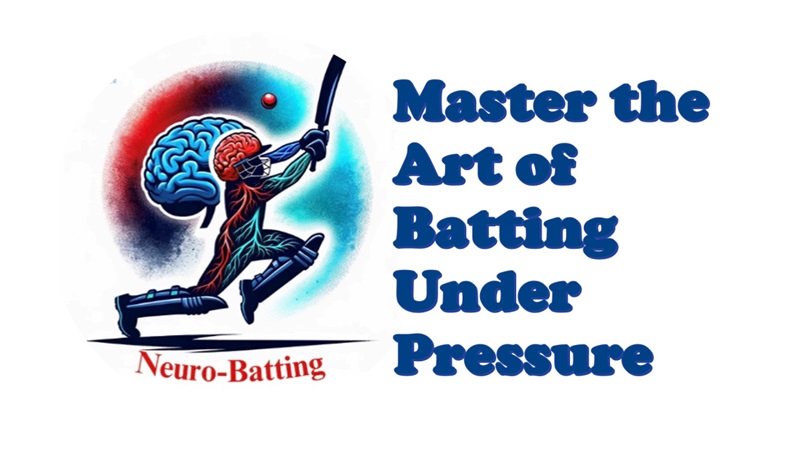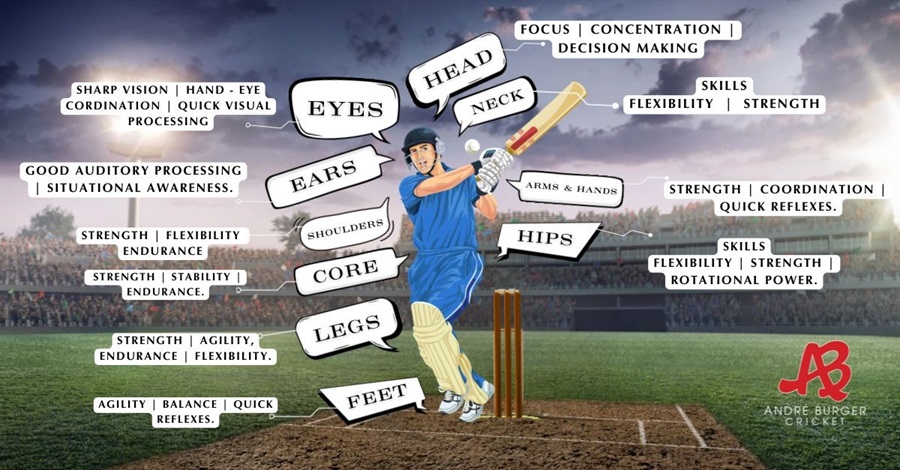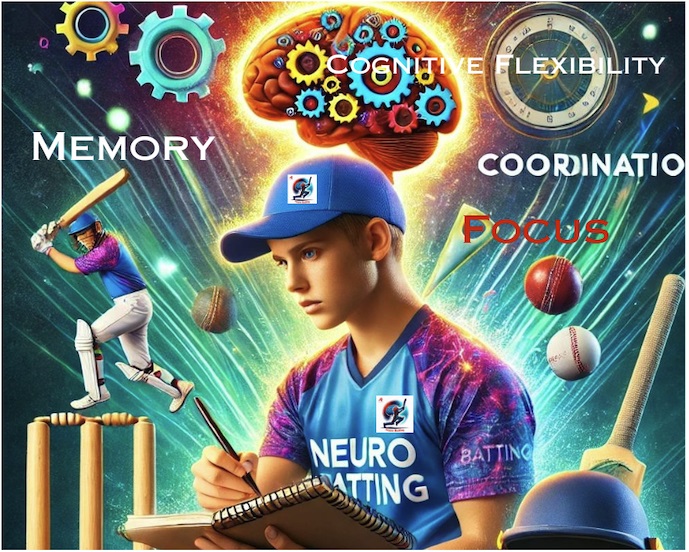About Me
Andre Burger
Cricket CoachAndre Burger Cricket
https://www.andreburgercricket.com/
Brisbane, Queensland, Australia
0414 686416
André Burger Cricket
Partner Sponsors
My Activity
question
Q: Neuro Batting- Enhancing Batting Performance Under Pressure: The Neuroscience Behind Effective Cricket Training
The Brain on the Cricket Field: Training vs. Game Conditions
Understanding how the brain operates under different conditions can revolutionise how we train athletes, especially batters in cricket. By tailoring training methods to activate and optimise specific brain areas, we can significantly enhance a player's ability to remain calm, focused, and effective when it matters most.
In a relaxed training environment, several brain regions are primarily engaged
The Brain on the Cricket Field: Training vs. Game Conditions
Understanding how the brain operates under different conditions can revolutionise how we train athletes, especially batters in cricket. By tailoring training methods to activate and optimise specific brain areas, we can significantly enhance a player's ability to remain calm, focused, and effective when it matters most.
In a relaxed training environment, several brain regions are primarily engaged
https://www.cricconnect.com/profile/720/andre-burger/blog/2254/neuro-batting-enhancing-batting-performance-under-pressure-the-neuroscience-behind-effective-cricket-training
blog post
The Brain on the Cricket Field: Training vs. Game ConditionsUnderstanding how the brain operates under differe ...
question
Q: In cricket, the ability to perform under pressure is paramount. Whether you're a budding youth player or an experienced professional, the link between physical readiness and mental ability is undeniable. The Neuro Batting Program recognises that to achieve peak performance, every link in the chain must be strong. While vision, cognitive, and mental skills are crucial, the physical attributes from the shoulders to the toes play an equally vital role.
By focusing on holistic development, the program ensures that no part of the batter's performance is left to chance, preparing them to handle pressure and excel in every game. Remember, a chain is only as strong as its weakest link, and the Neuro Batting Program ensures that every link is strengthened for success.
By focusing on holistic development, the program ensures that no part of the batter's performance is left to chance, preparing them to handle pressure and excel in every game. Remember, a chain is only as strong as its weakest link, and the Neuro Batting Program ensures that every link is strengthened for success.
https://www.cricconnect.com/profile/720/andre-burger/blog/2248/the-neuro-batting-program-strengthening-batters-from-head-to-toe
blog post
In cricket, the ability to perform under pressure is paramount. Whether you're a budding youth player or an experienced professional, the link between physical readiness and mental ability is unden ...
question
Q: Unlock Your Batting Potential with the Power of Writing!
Did you know that something as simple as writing by hand can benefit your batting performance?
Our Neuro Batting Program integrates handwriting into training to boost memory, sharpen focus, and fine-tune motor skills. Imagine remembering strategies better, staying laser-focused during crucial moments, and having impeccable hand-eye coordination.
It's not just about batting; it's about becoming a smarter, more confident player on and off the field. So, let's pick up those pens and write our way to batting excellence!
Did you know that something as simple as writing by hand can benefit your batting performance?
Our Neuro Batting Program integrates handwriting into training to boost memory, sharpen focus, and fine-tune motor skills. Imagine remembering strategies better, staying laser-focused during crucial moments, and having impeccable hand-eye coordination.
It's not just about batting; it's about becoming a smarter, more confident player on and off the field. So, let's pick up those pens and write our way to batting excellence!
https://www.cricconnect.com/profile/720/andre-burger/blog/2241/enhancing-batting-performance-through-handwriting
blog post
When students write by hand, it can offer several cognitive and visual benefits that can enhance their performance in our neuro batting program. By integrating handwriting into the neuro batting pr ...
question
Q: Emotions can have a significant impact on performance in cricket. When players experience intense emotions such as anxiety, fear, or anger, it can affect their focus, decision-making abilities, and physical performance, all of which can impact their overall performance on the field. Here are some ways emotions can impact performance in cricket:
· Focus: Emotions can impact a player's ability to focus on the game. When players are anxious or angry, for example, their attention can be diverted from the game, making them less able to focus on the task at hand.
· Focus: Emotions can impact a player's ability to focus on the game. When players are anxious or angry, for example, their attention can be diverted from the game, making them less able to focus on the task at hand.
https://www.cricconnect.com/profile/720/andre-burger/blog/2187/emotions-the-impact-on-performance
blog post
Emotions can have a significant impact on performance in cricket. When players experience intense emotions such as anxiety, fear, or anger, it can affect their focus, decision-making abilities, and ...
question
Q: Neuro Batting: Optimising Batting Performance through Neuroscience
We are excited to announce the upcoming launch of our "Neuro Batting" program, a progressive approach to cricket training that integrates the latest advances in neuroscience with traditional batting methods. This program is designed to improve batting skills and fundamentally enhance the cognitive aspects of batting performance under pressure.
🧠 Whether you're looking to refine your skills or coach others to reach their potential, Neuro Batting offers the tools to succeed.
🧠 At the heart of Neuro Batting is our commitment to understanding the brain's role in batting. Through meticulous research and innovative technology, we've developed training methods that enhance neural efficiency, decision-making speed, and focus—all crucial elements for a batter wanting to perform under pressure.
🏏 Our tailored program includes:
· Key Assessment Areas:
- Vision
- Cognition
- Psychological
· Neurofeedback Training: To improve concentration and reduce response times.
· Cognitive Simulations: High-intensity drills that mimic game situations to boost strategic thinking and mental agility.
This program is perfect for ambitious cricketers aiming to elevate their game and coaches dedicated to nurturing top-tier talent. By understanding and training the brain, our athletes can achieve exceptional levels of performance.
🔗 Join us as we unveil more details about Neuro Batting and prepare to transform the way you play. Our official launch is approaching, and we can't wait to share this journey with you.
We are excited to announce the upcoming launch of our "Neuro Batting" program, a progressive approach to cricket training that integrates the latest advances in neuroscience with traditional batting methods. This program is designed to improve batting skills and fundamentally enhance the cognitive aspects of batting performance under pressure.
🧠 Whether you're looking to refine your skills or coach others to reach their potential, Neuro Batting offers the tools to succeed.
🧠 At the heart of Neuro Batting is our commitment to understanding the brain's role in batting. Through meticulous research and innovative technology, we've developed training methods that enhance neural efficiency, decision-making speed, and focus—all crucial elements for a batter wanting to perform under pressure.
🏏 Our tailored program includes:
· Key Assessment Areas:
- Vision
- Cognition
- Psychological
· Neurofeedback Training: To improve concentration and reduce response times.
· Cognitive Simulations: High-intensity drills that mimic game situations to boost strategic thinking and mental agility.
This program is perfect for ambitious cricketers aiming to elevate their game and coaches dedicated to nurturing top-tier talent. By understanding and training the brain, our athletes can achieve exceptional levels of performance.
🔗 Join us as we unveil more details about Neuro Batting and prepare to transform the way you play. Our official launch is approaching, and we can't wait to share this journey with you.
answered
Q: Developing vision, cognitive, and mental skills is crucial for batting in cricket due to the complex and dynamic nature of the game. Each of these areas plays a significant role in enhancing a batter’s performance.
Vision Skills:
• Accuracy and Precision: Good visual acuity helps batters in accurately judging the speed, spin, and trajectory of the ball, enabling them to time their shots better and place them more precisely.
• Quick Reaction: Enhanced visual processing speed allows batters to react more swiftly to fast deliveries, increasing their chances of successfully hitting the ball.
Cognitive Skills:
• Better Decision Making: Cricket involves split-second decisions about whether to play a shot, what type of shot to play, and how aggressively to play it. Strong cognitive skills help in making these decisions quickly and correctly.
• Concentration and Focus: Batting requires sustained concentration over long periods, often in varying environmental conditions and against different types of bowlers. The ability to focus intensely on each delivery is key to a successful innings.
Mental Skills:
• Handling Pressure: Cricket, particularly in its longer formats, is as much a mental game as a physical one. The ability to remain calm and composed under pressure, maintain confidence, and manage anxiety is vital for success.
• Adaptability and Resilience: The game’s conditions can change rapidly due to factors like weather, pitch deterioration, and the bowling team’s tactics. Mental resilience and adaptability enable batters to adjust their approach and overcome challenges.
Impact on Technical and Tactical Aspects:
• Technique Improvement: Enhanced vision and cognitive skills directly contribute to aiding a batter’s technique, including their footwork, and shot execution.
• Strategic Gameplay: Advanced mental and cognitive abilities allow batters to understand the game situation better, anticipate the opposition’s tactics, and adapt their batting strategy accordingly. This includes selecting the right shots, rotating the strike, and building partnerships.
Vision Skills:
• Accuracy and Precision: Good visual acuity helps batters in accurately judging the speed, spin, and trajectory of the ball, enabling them to time their shots better and place them more precisely.
• Quick Reaction: Enhanced visual processing speed allows batters to react more swiftly to fast deliveries, increasing their chances of successfully hitting the ball.
Cognitive Skills:
• Better Decision Making: Cricket involves split-second decisions about whether to play a shot, what type of shot to play, and how aggressively to play it. Strong cognitive skills help in making these decisions quickly and correctly.
• Concentration and Focus: Batting requires sustained concentration over long periods, often in varying environmental conditions and against different types of bowlers. The ability to focus intensely on each delivery is key to a successful innings.
Mental Skills:
• Handling Pressure: Cricket, particularly in its longer formats, is as much a mental game as a physical one. The ability to remain calm and composed under pressure, maintain confidence, and manage anxiety is vital for success.
• Adaptability and Resilience: The game’s conditions can change rapidly due to factors like weather, pitch deterioration, and the bowling team’s tactics. Mental resilience and adaptability enable batters to adjust their approach and overcome challenges.
Impact on Technical and Tactical Aspects:
• Technique Improvement: Enhanced vision and cognitive skills directly contribute to aiding a batter’s technique, including their footwork, and shot execution.
• Strategic Gameplay: Advanced mental and cognitive abilities allow batters to understand the game situation better, anticipate the opposition’s tactics, and adapt their batting strategy accordingly. This includes selecting the right shots, rotating the strike, and building partnerships.
A:
https://vimeo.com/926064043
question
Q: Developing vision, cognitive, and mental skills is crucial for batting in cricket due to the complex and dynamic nature of the game. Each of these areas plays a significant role in enhancing a batter’s performance.
Vision Skills:
• Accuracy and Precision: Good visual acuity helps batters in accurately judging the speed, spin, and trajectory of the ball, enabling them to time their shots better and place them more precisely.
• Quick Reaction: Enhanced visual processing speed allows batters to react more swiftly to fast deliveries, increasing their chances of successfully hitting the ball.
Cognitive Skills:
• Better Decision Making: Cricket involves split-second decisions about whether to play a shot, what type of shot to play, and how aggressively to play it. Strong cognitive skills help in making these decisions quickly and correctly.
• Concentration and Focus: Batting requires sustained concentration over long periods, often in varying environmental conditions and against different types of bowlers. The ability to focus intensely on each delivery is key to a successful innings.
Mental Skills:
• Handling Pressure: Cricket, particularly in its longer formats, is as much a mental game as a physical one. The ability to remain calm and composed under pressure, maintain confidence, and manage anxiety is vital for success.
• Adaptability and Resilience: The game’s conditions can change rapidly due to factors like weather, pitch deterioration, and the bowling team’s tactics. Mental resilience and adaptability enable batters to adjust their approach and overcome challenges.
Impact on Technical and Tactical Aspects:
• Technique Improvement: Enhanced vision and cognitive skills directly contribute to aiding a batter’s technique, including their footwork, and shot execution.
• Strategic Gameplay: Advanced mental and cognitive abilities allow batters to understand the game situation better, anticipate the opposition’s tactics, and adapt their batting strategy accordingly. This includes selecting the right shots, rotating the strike, and building partnerships.
Vision Skills:
• Accuracy and Precision: Good visual acuity helps batters in accurately judging the speed, spin, and trajectory of the ball, enabling them to time their shots better and place them more precisely.
• Quick Reaction: Enhanced visual processing speed allows batters to react more swiftly to fast deliveries, increasing their chances of successfully hitting the ball.
Cognitive Skills:
• Better Decision Making: Cricket involves split-second decisions about whether to play a shot, what type of shot to play, and how aggressively to play it. Strong cognitive skills help in making these decisions quickly and correctly.
• Concentration and Focus: Batting requires sustained concentration over long periods, often in varying environmental conditions and against different types of bowlers. The ability to focus intensely on each delivery is key to a successful innings.
Mental Skills:
• Handling Pressure: Cricket, particularly in its longer formats, is as much a mental game as a physical one. The ability to remain calm and composed under pressure, maintain confidence, and manage anxiety is vital for success.
• Adaptability and Resilience: The game’s conditions can change rapidly due to factors like weather, pitch deterioration, and the bowling team’s tactics. Mental resilience and adaptability enable batters to adjust their approach and overcome challenges.
Impact on Technical and Tactical Aspects:
• Technique Improvement: Enhanced vision and cognitive skills directly contribute to aiding a batter’s technique, including their footwork, and shot execution.
• Strategic Gameplay: Advanced mental and cognitive abilities allow batters to understand the game situation better, anticipate the opposition’s tactics, and adapt their batting strategy accordingly. This includes selecting the right shots, rotating the strike, and building partnerships.
blog post
Developing vision, cognitive, and mental skills is crucial for batting in cricket due to the complex and dynamic nature of the game. Each of these areas plays a signific ...
question
Q: Unlock Your True Potential with Neuro Batting! 🏏
Over the next 8 weeks we will explore the Neuro Batting Principles and fundamentals. Our academy players have been using it for a number of weeks and I am very impressed with not only their progress but also their commitment to this concept.
1️⃣ Neuroplasticity Training: Ever imagined reshaping your brain to master those tricky shots? Neuroplasticity makes it possible! Through targeted practice, we're not just improving; we're evolving.
2️⃣ Cognitive Skills Development: Think fast, play fast! Enhancing your cognitive abilities means sharper decision-making and unparalleled focus when it matters most.
3️⃣ Stress Management: Pressure? What pressure? Learn to stay cool and collected in the hottest moments, turning stress into your secret weapon.
4️⃣ Motor Skill Optimization: It's all about moving smarter. Fine-tune your batting to perfection with the latest in motor skill science.
5️⃣ Visualization & Mental Rehearsal: See it, believe it, achieve it! Use the power of your mind to prepare for every delivery, building confidence and skill even off the field.
Fundamentals at the Core: Wrapped around these principles are the unshakeable fundamentals of batting - technique, physical conditioning, tactical awareness and mental toughness. Master these, and you're not just playing cricket; you're redefining it.
Every swing you take, every run you make, neuro batting is shaping you into the cricketer of tomorrow. Ready to transform your game? We will share this journey with you!
Andre Burger Cricket -
Over the next 8 weeks we will explore the Neuro Batting Principles and fundamentals. Our academy players have been using it for a number of weeks and I am very impressed with not only their progress but also their commitment to this concept.
1️⃣ Neuroplasticity Training: Ever imagined reshaping your brain to master those tricky shots? Neuroplasticity makes it possible! Through targeted practice, we're not just improving; we're evolving.
2️⃣ Cognitive Skills Development: Think fast, play fast! Enhancing your cognitive abilities means sharper decision-making and unparalleled focus when it matters most.
3️⃣ Stress Management: Pressure? What pressure? Learn to stay cool and collected in the hottest moments, turning stress into your secret weapon.
4️⃣ Motor Skill Optimization: It's all about moving smarter. Fine-tune your batting to perfection with the latest in motor skill science.
5️⃣ Visualization & Mental Rehearsal: See it, believe it, achieve it! Use the power of your mind to prepare for every delivery, building confidence and skill even off the field.
Fundamentals at the Core: Wrapped around these principles are the unshakeable fundamentals of batting - technique, physical conditioning, tactical awareness and mental toughness. Master these, and you're not just playing cricket; you're redefining it.
Every swing you take, every run you make, neuro batting is shaping you into the cricketer of tomorrow. Ready to transform your game? We will share this journey with you!
Andre Burger Cricket -
https://www.andreburgercricket.com
/question
Q: ATTENTION: BOWLERS AND COACHES.
Unleash Your Bowling Potential at the PaceLab High Performance Workshop with Steffan Jones!
Are you ready to elevate your bowling? Join us from January 21st to January 23rd at the National Cricket Centre in Brisbane for an exclusive workshop designed for bowlers who aspire to improve their bowling as well as Coaches wanting to learn about the PaceLab principles.
Under the expert guidance of Steffan Jones, a renowned figure in the world of cricket, the PaceLab High Performance Workshop offers a unique opportunity to refine your skills, understand advanced bowling techniques, and harness your true potential. This intensive training program is tailored for serious athletes seeking to enhance their speed, accuracy, and overall performance.
With cutting-edge equipment, personalized coaching, and a focus on biomechanics and fitness, you'll discover new strategies to outperform your competition. Spaces are limited, so don't miss this chance to be part of an elite group of cricketers taking their game to the next level. Book your spot now and be ready to bowl like never before!
Unleash Your Bowling Potential at the PaceLab High Performance Workshop with Steffan Jones!
Are you ready to elevate your bowling? Join us from January 21st to January 23rd at the National Cricket Centre in Brisbane for an exclusive workshop designed for bowlers who aspire to improve their bowling as well as Coaches wanting to learn about the PaceLab principles.
Under the expert guidance of Steffan Jones, a renowned figure in the world of cricket, the PaceLab High Performance Workshop offers a unique opportunity to refine your skills, understand advanced bowling techniques, and harness your true potential. This intensive training program is tailored for serious athletes seeking to enhance their speed, accuracy, and overall performance.
With cutting-edge equipment, personalized coaching, and a focus on biomechanics and fitness, you'll discover new strategies to outperform your competition. Spaces are limited, so don't miss this chance to be part of an elite group of cricketers taking their game to the next level. Book your spot now and be ready to bowl like never before!
question
Q: Hitting balls only in practice, while beneficial for honing technical batting skills, may not fully prepare a batter for performing under pressure. While technical skills are fundamental, they need to be complemented with mental, cognitive, and vision skills for a player to be well-rounded and successful in the dynamic and varied contexts of cricket.
1. Limited Adaptability: A player with excellent technical skills but lacking in cognitive and mental aspects may struggle to adapt to varying game conditions and situations.
2. Poor Decision-Making: Cricket involves quick decision-making, like choosing the right shot or ball, or making tactical field placements. Without strong cognitive skills, a player might repeatedly make poor choices, diminishing the effectiveness of their technical prowess.
3. Struggle Under Pressure: High-pressure situations are common in cricket, such as a close run chase or defending a low total. Players who have not developed mental toughness might falter in these scenarios, unable to perform to their technical potential.
4. Difficulty in Long Formats: In formats like Test cricket, mental endurance and focus are as important as technical skill. Players who haven’t developed these aspects might find it challenging to maintain concentration and consistency over prolonged periods.
5. Over-Reliance on Technique: There's a risk of becoming too mechanical or predictable. Opponents can easily strategize against a player who is technically sound but lacks the unpredictability that comes with strategic thinking and situational awareness.
6. Difficulty in Self-Improvement: Without cognitive and mental skills, players might find it hard to critically analyse their performance, learn from mistakes, and make necessary adjustments. This can hinder their growth and development as a cricketer.
7. Reduced Longevity in the Sport: Players who rely solely on technical skills might have a shorter peak period. As physical abilities decline with age, it’s often the mental and cognitive aspects that help experienced players maintain high-performance levels.
1. Limited Adaptability: A player with excellent technical skills but lacking in cognitive and mental aspects may struggle to adapt to varying game conditions and situations.
2. Poor Decision-Making: Cricket involves quick decision-making, like choosing the right shot or ball, or making tactical field placements. Without strong cognitive skills, a player might repeatedly make poor choices, diminishing the effectiveness of their technical prowess.
3. Struggle Under Pressure: High-pressure situations are common in cricket, such as a close run chase or defending a low total. Players who have not developed mental toughness might falter in these scenarios, unable to perform to their technical potential.
4. Difficulty in Long Formats: In formats like Test cricket, mental endurance and focus are as important as technical skill. Players who haven’t developed these aspects might find it challenging to maintain concentration and consistency over prolonged periods.
5. Over-Reliance on Technique: There's a risk of becoming too mechanical or predictable. Opponents can easily strategize against a player who is technically sound but lacks the unpredictability that comes with strategic thinking and situational awareness.
6. Difficulty in Self-Improvement: Without cognitive and mental skills, players might find it hard to critically analyse their performance, learn from mistakes, and make necessary adjustments. This can hinder their growth and development as a cricketer.
7. Reduced Longevity in the Sport: Players who rely solely on technical skills might have a shorter peak period. As physical abilities decline with age, it’s often the mental and cognitive aspects that help experienced players maintain high-performance levels.


















